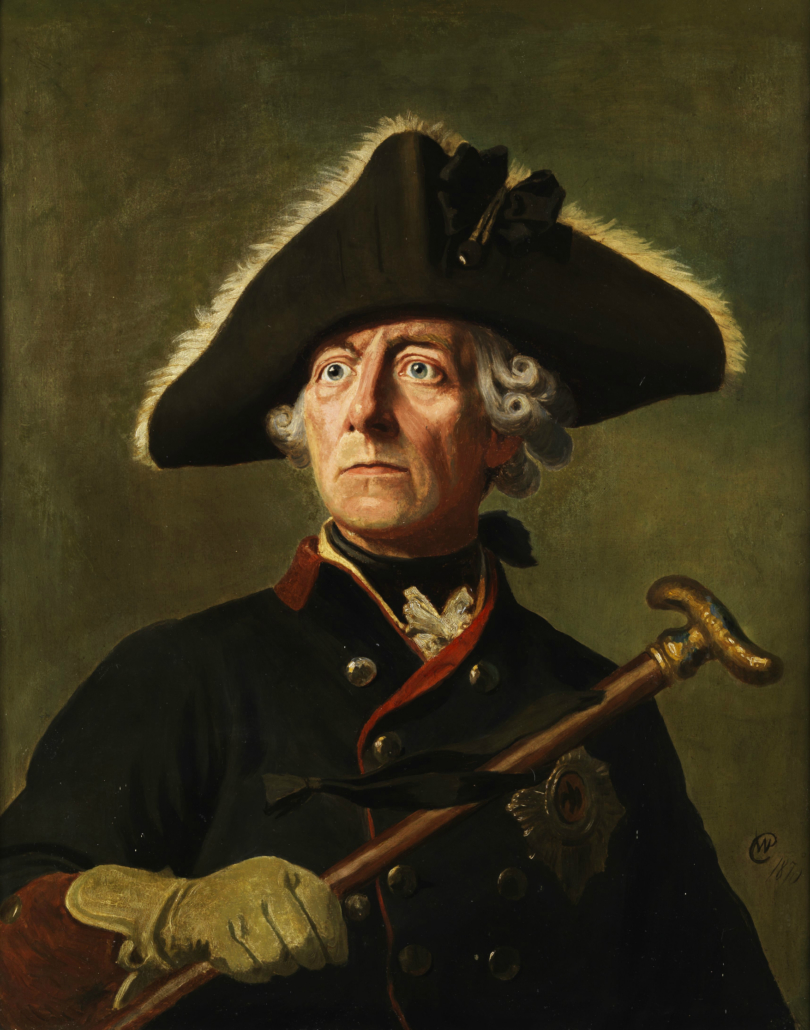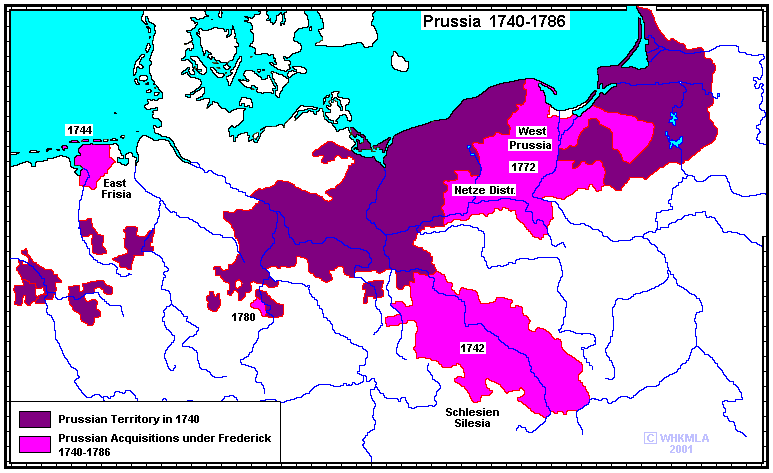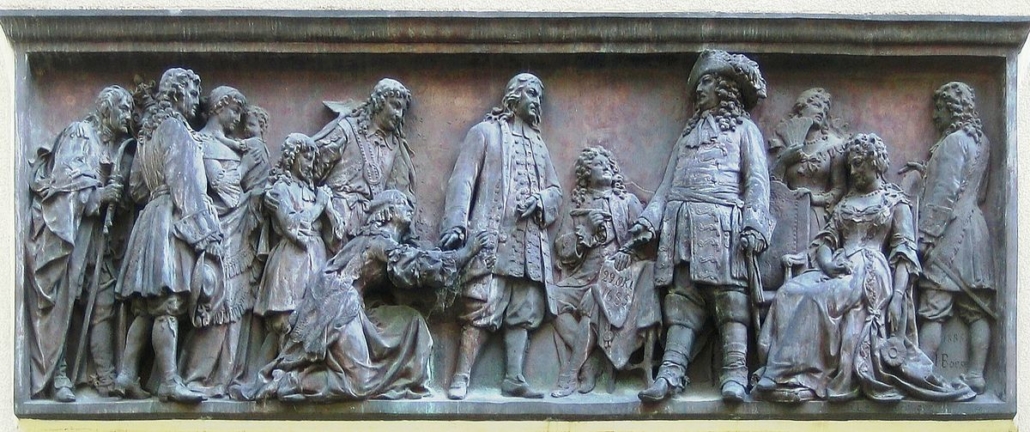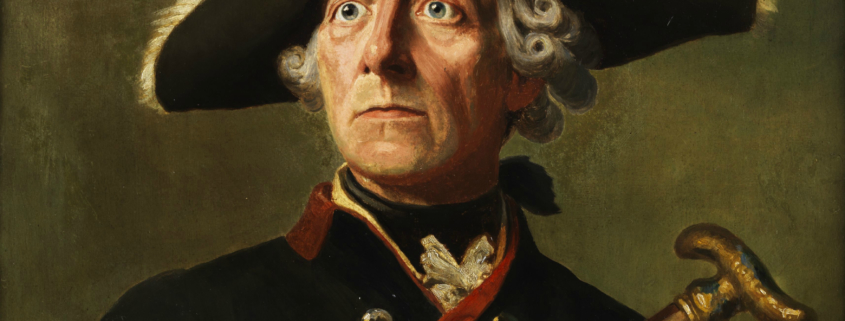Frederick the Great’s Jewish Policy: Between Containment and Profit, Part 1
Frederick the Great’s Jewish Policy: Between Containment and Profit

Frederick II of Prussia, known as “the Great,” is one of the celebrated figures in Western history. On the one hand, he was an accomplished statesman and military leader, who through skill and dogged determination in wars with far larger states, doubling the size of his vulnerable and relatively poor north-German realm, turning Prussia into one of Europe’s great powers. But Frederick was also an almost unique example in history of a statesman who was also a genuine intellectual, the paradigmatic “enlightened despot,” who undertook reasonable reforms and could converse with the great minds of his day.
Frederick’s political works are a classic statement of autocratic good government.[1] Certainly, while the republican tradition is in a sense characteristically and almost uniquely Western, we should not forget that for most our history we have been governed by monarchs. Roman emperors and medieval and early-modern kings certainly presided over as many our great achievements as did the Hellenic city-states or the modern republics.
In this article, I would like to detail a little-known aspect of Frederick the Great’s government: Jewish policy. Frederick had inherited somewhat contradictory policies from his forefathers: on the one hand preventing the growth of the Jewish population (notably by limiting the right of residence), for Jews were considered to be involved in illicit trade and would drive Christians out of business, and on the other hand exploiting Jewish business acumen, whether by taxing them, getting loans from them, or using their skills for complex, and sometimes dubious, monetary transactions.
Frederick’s attitude towards this inheritance is of interest because, as monarch of the Enlightenment, he held no religiously-motivated hostility towards the Jews, nor was he affected by the anti-Semitic racial theories which would become popular in the nineteenth century. Instead, the Prussian king’s policies were determined by his classical education, which informed his outlook in general, political pragmatism, and his actual personal experience with Jews.
Frederick essentially upheld his predecessors’ approach, justifying hard-headed population policies limiting Jewish growth by the need to protect the economic balance, mores, and well-being of Prussia as a whole. In this, Frederick’s approach appears reminiscent of the muscular communitarian population policies of Plato and Aristotle, two philosophers whom he had carefully studied. As we shall see, while Frederick maintained and reinforced the policies of his predecessors, he was not able to overcome their contradictory character, paving the way for their dismantlement under his successors.
The Political Inheritance: Jewish Policy in Prussia before Frederick II

As elsewhere in Europe, whether Jewish settlement should even be allowed was a contested question in the history of Brandenburg-Prussia. In 1309, the Teutonic Order, a state of warrior-monks which had conquered East Prussia and violently converted the native pagans to Christianity, prohibited Jews from entering their territory. Nonetheless, given the economic importance of Jewish merchants in Poland, Jews were allowed to enter temporarily for business.
The Great Elector of Brandenburg, George William, became duke of Prussia in 1619, acquiring the Order’s former lands. The Jews’ economic importance had gradually grown over the centuries, eventually attaining a dominant position in East Prussia. According to the Jewish Virtual Library:
In 1664 Moses Jacobson de Jonge of Amsterdam received very favorable commercial privileges (subsequently renewed) in Memel , where he became the most important merchant, paying more customs dues than any of his Christian counterparts. He became a Court Jew in 1685 and his sons inherited the function. In Koenigsberg, capital of East Prussia, Jews were permitted to graduate in medicine from the university in 1658, and Jewish merchants were encouraged to settle soon after. A synagogue was built there in 1680 and a cemetery opened in 1703. The community grew during the 18th and 19th centuries, remaining the economic, social, and religious center of the region. In the latter half of the 18th century Jewish communities were founded in Elblag, Marienwerder, Lyck , and elsewhere.[2]
In Branbenburg proper, the principality centered around Berlin, Elector Joachim II had expelled Jews in 1573. Frederick William of Brandenburg (r. 1640–1688), also known as the Great Elector, reversed this policy. He inherited small territories in western Germany containing Jews and granted them the right to remain. Frederick William also encouraged Jewish settlement to favor reconstruction following the terrible devastation of the Thirty Years’ War (which killed a third of the population of Germany). There is the common pattern of undemocratic princes for selfish economic reasons granting favors to the Jews against the popular will, as the Jewish Virtual Library writes:
The elector disregarded his subjects’ objections to Jewish settlement, being concerned with the economic benefits he derived from direct taxation of the Schutzjuden [Protected Jews, an official status] and indirect taxation through customs, tolls, and excise, which the Jews paid at a higher rate. During his reign, the Berlin Jewish community grew to 40 families, that of Halberstadt to 86, that of Frankfurt to 43, while 15 families had settled in Pomerania.[3]
Frederick William allowed Polish Jews to trade (but not settle) in Brandenburg, he hired Israel Aron as a military contractor, purveyor to the mint, and Court Jew, and he allowed 50 Jewish families expelled from Vienna in 1670 to settle in Berlin, on the grounds of their being “rich and wealthy persons, prepared to bring and invest their means here.”[4]
Frederick William then had already set many of the trends of Jewish policy in Brandenburg-Prussia: general opposition to Jewish settlement, while allowing exceptions insofar as Jews were economically useful to the State, whether as temporary merchants, investors, military contractors, or minters.
In his history of Prussia, Frederick the Great writes positively of his ancestors’ Jewish policy as reflecting moderation, tolerance, and economic good sense (a passage written around 1748):
The electors of Brandbenburg acted wisely in these troubles: they were moderate and tolerant. Frederick-William, who had acquired, by the peace of Westphalia, provinces which gave him Catholic subjects, did not persecute them; he even allowed a few Jewish families to establish themselves in his States, and granted them synagogues.[5]
Frederick later makes clear that the primary benefit was in enabling petty trade with Poland: “The Elector even allowed a few Jewish families to take residence in his States; Poland’s vicinity made their mediation useful, to discharge into this kingdom the dregs of our thrift stores.”[6] In the same passage, Frederick praises the Great Elector for religious tolerance in welcoming 20,000 hard-working Calvinists exiled from France.
Frederick’s father was Frederick William I of Prussia (reigned 1713–40), so-named because by then and unlike the Great Elector, the duchy of East Prussia had been converted into a formal kingdom. Frederick William was a notoriously tough and frugal monarch, focusing above all on the development of his army and earning the title of ‘Soldier-King.’ As a hardheaded ruler, Frederick William introduced the principle of halting the growth of the Jewish population, unless this was specifically shown to be economically beneficial. The Jewish Virtual Library writes:
Under his son Frederick William I (1713–40), a generally harsh regime was introduced. On his accession he ordered a thorough inquiry into Jewish affairs, the outcome of which was the law of 1714 restricting to one the number of sons who could inherit their father’s right of residence (Schutzbrief); to be granted this right the second son had to possess 1,000 taler and pay 50, and the third son twice these amounts. Thus a dominant theme in Prussian-Jewish relations, the attempt to restrict and even to reduce the number of Jews, was formally introduced. In 1717 the king appointed Moses Levin Gomperz as Oberaeltester (“chief elder,” parnas) of Berlin and Prussian Jewry, an appointment probably connected with the supervision of the just distribution of the tax load, conducted by representatives of communities and Landjudenschaften [self-governing Jewish communities]. In 1728 the sum was fixed at 15,000 taler annually, to be reapportioned every five years. In 1730 a new Jewry law was promulgated: the eldest son was now obliged to own 1,000 and pay 50 taler and the second twice these amounts; all were subject to the condition that the number of protected Jews (Schutzjuden) in any given locality should not increase. Foreign Jews in possession of at least 10,000 taler were allowed to settle in Prussia. The law also prohibited Jews from engaging in all crafts (except seal engraving) competing with Christian guilds; it prohibited them from dealing in a large number of goods (mainly local produce). Peddling, in particular, was suppressed. Commerce in luxury wares (expensive textiles, spices, etc.) was permitted, as was moneylending and dealing in old clothes. The law applied not only to Brandenburg but to all Prussian territories, creating uniform conditions for the Jews and defining (in article 24) their juridical relationship to the state. The regular tax load was raised, in addition to extraordinary exactions. Jewish merchants were encouraged to become entrepreneurs and invest in manufacture, particularly of textiles (silk, ribbons, satin, lace, etc.). These businessmen were granted highly favorable conditions. Thus the king passed on to his son a basically contradictory policy, at the same time mercantilist and anti-Jewish; needing and encouraging Jews for their economic contribution, he attempted to restrict their rights and numbers.[7]
Frederick’s “Enlightened” Toleration of Religious Minorities

Nineteenth-century relief showing the arrival of the Huguenots in Prussia (1685). After the Wars of Religion, Prussia welcomed productive French Protestants such as these.
Frederick the Great’s own knowledge of Jews and Judaism was informed by a wide-ranging Christian and classical education which has since long gone out of fashion in the West. He was familiar with the Bible, Jewish ethics, and the many stories of the ancient Israelites. However, Frederick often voiced harsh criticisms of the Jewish religion, but this was generally no worse than his contemptuous attitude towards organized religions in general, including Christianity.
Frederick’s attitude towards religious minorities was, a priori, one of tolerance typical of the Enlightenment period: rather than excluding or persecuting religious minorities, bloody massacres had been sadly common during the Wars of Religion, he was among those who would welcome them so long as they were productive citizens. He is even supposed to have said: “All religions are just as good as each other, as long as the people who practice them are honest, and even if Turks and heathens came and wanted to populate this country, then we would build mosques and temples for them.”[8]
Frederick’s attitude was then symptomatic of many philosophers, from the ancient Stoics to the present day, who see the presence of reason and pro-social instincts in all human beings as a means to attain universal brotherhood, not recognizing that these might be unequally distributed and inflected by powerful human tendencies, such as greed and ethnocentric sentiments. Frederick’s often critical views on the Jews were then not motivated by Christian, chauvinist, or later racial ideology.
Frederick’s General Observations on Jewish Behavior
Frederick would frequently make negative observations on Jewish culture and behavior. He spoke of the prevalence of endogamy in Jewish society, a practice which has the effect of maintaining the integrity of the Jewish gene pool and creating powerfully cohesive familial clans. He wrote in one letter: “I can inform you here of no more interesting news than the engagement of my brother Ferdinand with the daughter of my sister De Schwedt, it’s a Jewish-style wedding [i.e., an uncle-niece marriage which is permissible in Jewish law], which stays in the family.”[9] Frederick furthermore associated Jews with dishonesty. He wrote of someone: “[He] seems to me false as a Jew.”[10]
Frederick was also aware of the influence that wealthy Jews could already have over the politics of major European nations, especially England. In his Memoirs to Serve for the History of the House of Brandenburg, he writes that a wealthy Dutch Jew had bankrolled William of Orange’s take-over of England in the so-called “Glorious Revolution” (actually a small invasion and coup) of 1688: “A Jew of Amsterdam, named Schwartzau, lent him [William of Orange] two million for this expedition, telling him: ‘If you are fortunate, I know you will repay them to me, if you are unfortunate, I consent to losing them.’”[11] Elsewhere, Frederick seems to imply that the wealthiest Jews of the Netherlands had acquired their goods unethically.[12] He was also aware of contemporary efforts to naturalize Jews in England as citizens and of English popular opposition to this.[13]
Frederick’s personal views on Jews in no way inhibited dialogue and collaboration with individual Jews. The king wrote to the Jew Lion Gomperz saying he enjoyed the latter’s critique of the German language.[14] Frederick had also granted the famous Jewish intellectual Moses Mendelssohn the status of a “Protected Jew,” giving him right of residence in his realm.
[1] I have translated and/or commented on several of Frederick’s political works for Counter-Currents: https://www.counter-currents.com/tag/frederick-the-great/
[2] “Prussia,” Jewish Virtual Library: https://www.jewishvirtuallibrary.org/prussia-virtual-jewish-history-tour
[3] Ibid.
[4] Ibid.
[5] Frederick the Great, Œuvres de Frédéric le Grand (Berlin: Royal Printers, 1846-56), vol. 1/p. 239. I am grateful to the University Library of Trier for having made available uploaded scans of the entirety of Frederick’s collected works.
[7] “Prussia,” JVL: https://www.jewishvirtuallibrary.org/prussia-virtual-jewish-history-tour
[8] Quoted in Christopher Clarke, Iron Kingdom: The Rise and Downfall of Prussia 1600-1947 (London: Penguin, 2007) pp. 252-3.
[9] Frederick, Œuvres, 27/1/299.
[10] Frederick the Great, Politische Correspondez (Berlin: Duncker & Homblot, 1879-1939), 4/343.
[11] Frederick, Œuvres, 1/115. On this banker, also known as Francisco Suasso, see David B. Green, “This Day in Jewish History: 1710: The Banker Who Helped William of Orange Conquer England Dies,” Haaretz, April 22, 2015. https://www.haaretz.com/jewish/this-day-in-jewish-history/.premium-1.652926






You have reason to believe that my senses left me, when I recommend that you look up CUM CUM as well as CUM EX. Two exceedingly well thought out, unsurpassed 50+ billion Euro scams, that stole from the European taxpayers big time, just as in the days of Frederick the Great: and ever since, with a six year hiatus.
The Hamburg Warburg Bank was leading this scam with the Deutsche Bank also involved, in addition to numerous others, including large brokerage houses and dozens of large investors,served by dozens of tax lawyers as foot soldiers, housed high atop a Frankfurt skyscraper.
Basically taxes were unethically refunded, at rates larger than their original amount. The scam migrated to numerous European states. A German T.V. network assembled an international team of forty experts and courageous journalists, who went undercover and got an insider to spill the beans on their program, after extensive distortion of his facial features. [ I forgive them for their choice of pseudonym: B. Frey, since they forewent using the following letter for an initial ].
Feeble legislation was passed through lobbyists, essentially creating a blueprint to afford an end run around it. Perhaps Browder’s similar schemes in Russia were not all that original. Finally blaming Putin and the KGB and of course getting that idiot man-child McCain to initiate the RUSSIA AND MOLDOVA JACKSON -VANICK REPEAL AND SERGEI MAGNITSKY RULE OF LAW ACCOUNTABILITY ACT OF 2012.
A euphonious designation: as reassuring as Brussel’s European Commissioner for Economic and Financial Affairs TAXATION and Customs, French Pierre Moscovici, son of Jewish Romanian immigrants.
Same old.
How exciting to see a series of articles on Friedrich II, or Friedrich the Great. And he was great.
Now more than ever we need to be Heroes of a Culture Crisis.
To do that well we need models, or better yet, powers of example, contemporary and historical. In that respect, Friedrich is an excellent historical power of example.
He is a hero because he never lost his courage. He survived his share of defeats and humiliations and kept himself going long enough to establish Prussia as a European power. That would have been enough for any one man.
But, by far, his most important contribution to European culture, and all culture, was the consequence of his capacity for self-transcendence. He was able to see that his previous attempts to “solve” problems through avoidance and sentimentality was disastrous, to himself, his kingdom and his people.
The consequence of this internal struggle was that he was able to come to an understanding of the nature of power itself.
Maybe this is why Carlyle’s masterpiece on Friedrich focused mainly on his wars and comparitively little on the rest of his life.
In any event, we need as much courage and wisdom as we can muster. And nowhere is this truer than in our efforts to understand the nature of power.
Dear Charles
Can you send me a link to this programme please?
Many thanks
BB
B.B. commence with CumEx Files – Wikipedia, then take it from there. Pay attention to the articles referred to in the footnotes. A mass of material: over a hundred banks involved.
Naturally including M.M. Warburg, whose senior was a close adviser to the Kaiser and brother to Paul of Fed fame and Felix who married Schiff’s daughter when partner at Kuhn Loeb on Wall Street.
All on the periphery of the crowd that wanted Zurich resident Lenin in Petrograd to start the revolution. Russia’s allies refused Lenin passage there, because he was an ideological enemy. Imagine, on Easter Sunday, April 17, 1917, he phoned the U.S legation in Zurich, to seek support, but their young American in charge was out for a tennis match and told him to come back on Monday to talk. A young Allen Dulles thus stayed out of that well-planned and -executed mess, the opposition to which, including his brother John Foster, determined the remainder of their lives.
It was up to Baron von Romberg, head of the Imperial Legation there to arrange for the sealed train. It is said, that the Kaiser knew nothing of the train, but did not later disapprove of the scheme, which ultimately dethroned him, as planned long term, and endangered Germany and all of Europe on July 15, 1941, Stalin’s planned ” Operation Icebreaker “. [ Suvorov ].
The video, in German, to which I referred, showed the Berlin CEO of Warburg, in his five thousand dollar suit, leaving their just completed conference on ethics and values, including philanthropy: completing the pattern recognition.
Mr. Frey, would you happen to know if there is any connection between the Jacob Schiff of Kuhn, Loeb and today’s Congressman Adam Schiff, chairman of the House Intelligence Committee?